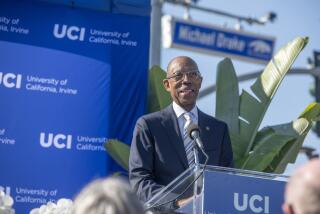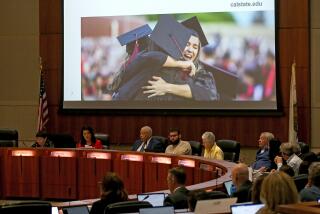Huttenback Target of Insurance, Tax Inquiry
- Share via
SANTA BARBARA — Former University of California, Santa Barbara, Chancellor Robert Huttenback is under investigation for insurance fraud, embezzlement and tax fraud, an investigator says in a court document.
The alleged insurance fraud involved an $8,000 claim for silverware that Huttenback and his wife reported stolen in 1983 but later said they found under a couch, Santa Barbara County Sheriff’s Detective Owen B. Thomas said in a search warrant affidavit. According to Thomas, the insurance company that paid the claim was not notified that the silverware had been found until last year, after the investigation was under way.
The embezzlement and tax-fraud aspects of the case stem from allegedly unauthorized improvements made at Huttenback’s home at university expense.
Huttenback’s attorney, George Eskin, strongly denied all of the allegations and vainly sought to seal the affidavit on Monday.
“My goal . . . is to prevent the publication of a defamation,” Eskin said.
But Superior Court Judge Arnold Gowans said Huttenback deserved no special treatment.
“Let the public read whatever they want to,” Gowans said. “Let the chips fall where they may.”
The nine-page sheriff’s affidavit unsealed Monday was used to obtain a warrant for searching Huttenback’s home Feb. 27. No charges have been filed against Huttenback.
Inappropriate Expenditures
Huttenback resigned as chancellor last July, a month after a UC audit concluded that there had been $174,087 in unauthorized and inappropriate expenditures for improvements at his home from July, 1983, through April, 1986. He has been repaying the sum as ordered.
Thomas says he took pictures of the home’s interior to help provide “evidence of the crime of felonious embezzlement” by documenting work done there, including a $104,000 kitchen renovation.
But Eskin countered in a written response: “Huttenback believed he was acting within his authority as chancellor when he approved limited and specific expenditures from discretionary, non-state funds, and he was supported in that belief by his chief budget officer, Assistant Chancellor Roger Horton.” Huttenback has said he believed the expenditures on the house were appropriate because of the extensive entertaining and fund-raising he did there on behalf of the university.
Thomas also alleged that Huttenback and wife, Freda, willfully violated tax laws by failing to disclose as income the money spent by the university at the house. He said he was told by the California Franchise Tax Board that the expenditures should have been reported as income.
But Eskin said the improvement expenditures “are more properly described as loans,” not income, because of an amortization and depreciation plan that Huttenback and Horton set up. He also said the Huttenbacks didn’t know how much had been spent on the house until the audit was done last year, so their first opportunity to pay taxes would be on this year’s return.
He also said the audit relied on information provided by Holger Chris Ferdinandson, a campus building official who pleaded guilty last Friday to three counts of embezzlement in a related case.
Thomas alleges that an insurance fraud began in June, 1983, when the Huttenbacks reported antique silverware stolen from their home. They estimated the loss at $12,000 and asked for quick reimbursement because they were going to Europe and planned to purchase replacement silverware; they received $8,000, the affidavit says.
Police Investigation
Shortly after the Huttenbacks returned from Europe and a week after campus police notified Freda Huttenback that lie-detector tests were being arranged for caterers and housekeepers, she reported that most of the missing silverware had been found under a couch. She said she “preferred not to know who had taken her silverware and wanted no further investigation,” the affidavit says.
The Huttenbacks never reported the recovery of the silverware to their insurance company, however, until last December--after the insurance claim had been under investigation for two months, Thomas says.
“I believe Mr. and Mrs. Huttenback submitted a fraudulent insurance claim . . . in order to obtain monies for their European visit in July and August, 1983,” Thomas’ affidavit says.
Eskin says the Huttenbacks discovered the stolen silverware upon their return from Europe and reported the discovery to the insurance company. They were told that because some silver still was missing, they could keep the $8,000, he said.
More to Read
Sign up for Essential California
The most important California stories and recommendations in your inbox every morning.
You may occasionally receive promotional content from the Los Angeles Times.













